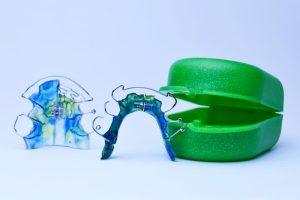
For people using braces or Invisalign to straighten their teeth, retainers provide an easy way to ensure their results will last for a lifetime. But every retainer needs to be replaced at some point–how often should this be done? How can you help a retainer last as long as possible? We answer both of these questions and more in today’s blog!
Why Wearing Retainers is Important
Going into orthodontic treatment, most people assume they will need to wear braces or use Invisalign for a few months or years, and then that’s it. But, right after an appliance has been removed, the tissues holding the teeth in place are quite loose, meaning they can actually drift back toward their starting positions, undoing the whole process! Essentially, braces or Invisalign straighten the teeth, and retainers make sure they stay that way.
The Lifespan of Retainers
The two main types of retainers are removable acrylic ones and fixed permanent ones. The lifespan of each largely depends on how well a patient takes care of their mouth as well as the retainer itself. Both can potentially last for years if a patient routinely cleans and avoids damaging them. On average, removable retainers tend to last for about 5-10 years, while permanent retainers can potentially endure for decades.
Tips for Taking Care of a Retainer
- Keep up with your brushing and flossing routine, as this will remove plaque, bacteria, and food particles from your mouth that could end up on your retainer and cause it to become gross or taste funny.
- Don’t ever soak your retainer in hot water, as this can cause it to change shape and not fit correctly.
- With a permanent retainer, be careful when chewing particularly hard foods so that you don’t accidentally damage the bonding that is holding the bar in place.
- Removable retainers should be brushed and rinsed every day.
- It’s important to learn how to floss around a permanent retainer in order to remove plaque that can become trapped against it. Your dentist or orthodontist can show you how or talk about special flossers you can buy.
- If a retainer is starting to feel loose or has obvious cracks, let your orthodontist know immediately. By acting quickly, they may be able to fix a small problem and save the retainer from needing to be replaced.
- Bring your retainer to your regular checkups so your dentist can find potential problems before they cause serious issues.
By wearing a retainer, a patient can enjoy peace of mind knowing that their newly straightened smile will continue to look and feel great for decades. And, with a little bit of maintenance along with help from an orthodontist, these appliances can easily keep doing their job for several years to come.
About the Author
Dr. Jeffrey Shirck is an award-winning orthodontist and Elite Invisalign Provider. He has helped thousands of patients of all ages maintain their straight smiles with both types of retainers, and if you have any questions about wearing or getting the most out of your appliance, all you need to do is ask! To get in touch with Dr. Shirck or to schedule a FREE consultation, click here.

